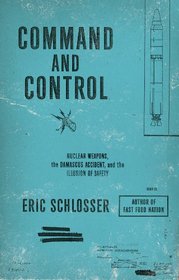Helpful Score: 1
Thermonuclear weapons built, tested, and assembled en masse by the US government are misplaced, mistreated, and treated with little respect to the damage they can cause. This results in accidents where nuclear bombs fall out of, or off of military jets, are engulfed in flames, or fall off of carts resulting in hundreds of near catastrophic incidents, including some which could have started nuclear war between the United States and the Soviet Union. Sounds like a horror novel, doesn't it? Unfortunately, this book is nonfiction and these incidents happen much more often than you would think and are covered up by the government. Prior to reading this, I had only a vague idea that the government had nuclear weapons safely stashed away in case of emergency. Little did I know, as most of the United States population does, that nuclear weapons are all around us, deep in missile silos, aboard Navy vessels, and on many Air Force jets. Most of these have very rudimentary safety precautions, if any, and are just accidents waiting to happen. Author Eric Schlosser has extensively researched the history of thermonuclear weapons in the United States and stumbled across a minefield of near misses and tragic accidents that the government most definitely does not want you to know about. This book scared me more than any horror novel has, and it should scare you too. This book has been an eye-opening experience for sure and I would recommend it to anyone living in the United States, particularly those who believe that we are safer for having nuclear weapons.
Helpful Score: 1
I started this book on the assumption it would just be an in depth examination of assorted US nuclear weapons accidents since their invention. Pleasantly I was surprised to find that it was much more. The main examination of the book is incident in Damascus, AK, involving a Titan II missile. Interspersed with this story are chapters covering the development not only of nuclear weapons but targeting, command/control, alert procedures and other incidents involving nuclear weapons.
Schlosser does an excellent job keeping to a chronological order and not bouncing around. He repeatedly ties incidents together to prove the point that it took both the Dept of Defense and the Federal government as a whole to learn the critical lessons of having nuclear weapons. There were a multitude of accidents that could have easily been avoided if the decision-makers had listened to the real experts, the people who built the bombs and warheads to begin with.
During the Damascus Accident, Schlosser points out the obvious almost comically stance that the US Air Force took in their obstinate refusal to confirm or deny that a nuclear warhead was involved. I mean really did they think that the general public wouldn't pick up on this when it involved a ICBM unless their is some sort of secret policy to only put warheads on some of the missiles to keep the Ruskies guessing which missiles are actually armed.
This book is a must read for military history buffs. The flip side is that I would also recommend it for any decision maker in any organization. During the response to the Damascus Accident the response with repeat with missed opportunities to resolve the problem before the explosion. Time and time again commanders on scene either refused to take action or had their hands tied by higher ups hundreds of miles away.
In the end the reader will come away from this book wondering how the hell we did not accidentally wipe out at least one of our own cities or military bases. It will actually scare you how close we came a few times.
Schlosser does an excellent job keeping to a chronological order and not bouncing around. He repeatedly ties incidents together to prove the point that it took both the Dept of Defense and the Federal government as a whole to learn the critical lessons of having nuclear weapons. There were a multitude of accidents that could have easily been avoided if the decision-makers had listened to the real experts, the people who built the bombs and warheads to begin with.
During the Damascus Accident, Schlosser points out the obvious almost comically stance that the US Air Force took in their obstinate refusal to confirm or deny that a nuclear warhead was involved. I mean really did they think that the general public wouldn't pick up on this when it involved a ICBM unless their is some sort of secret policy to only put warheads on some of the missiles to keep the Ruskies guessing which missiles are actually armed.
This book is a must read for military history buffs. The flip side is that I would also recommend it for any decision maker in any organization. During the response to the Damascus Accident the response with repeat with missed opportunities to resolve the problem before the explosion. Time and time again commanders on scene either refused to take action or had their hands tied by higher ups hundreds of miles away.
In the end the reader will come away from this book wondering how the hell we did not accidentally wipe out at least one of our own cities or military bases. It will actually scare you how close we came a few times.




